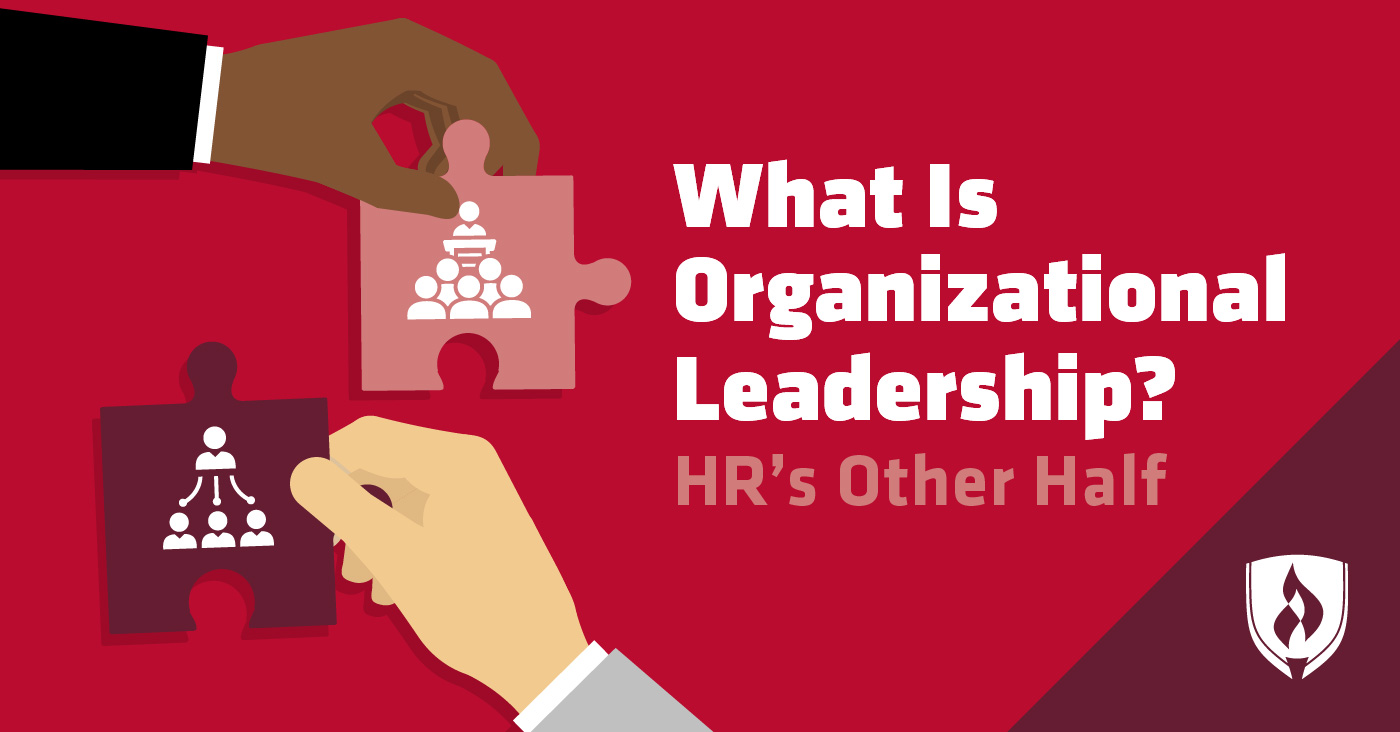
You are a leader and always have been. While some people quake at the thought of stepping up and taking charge, that is your dream. You’ve been searching high and low for a career path that lets you put this talent to the test, and you have finally stumbled across something that sounds promising: Organizational leadership.
But what is organizational leadership? You see it paired with the human resources field a lot but have never understood the differences between the two. Join us as we help you make sense of the two fields and how they overlap.
What is organizational leadership?
Let’s begin with your most pressing question—what is organizational leadership?
“Organizational leadership is a management strategy that focuses on the organization as a whole, and the processes needed to unify the individual and organizational goals,” says Dr. Jennifer Trout, department chair of the Human Resources Management and Organizational Leadership program at Rasmussen College.
“This role focuses on strategy and systematic approaches to the areas of performance and training for individuals throughout the organization to meet strategic goals through empowerment and developing a strong work ethic.”
In short, organizational leadership is the merger of management and human psychology. Those who excel in organizational leadership are able to gauge and understand the skills and talents of each employee and leverage those talents to help both the company and employees succeed.
Why is organizational leadership important?
Now that you know what organizational leadership is, let’s take a look at why it is so important in businesses.
“The [organizational] leadership needs to chart the course for where the company is going and provide the managers and staff with the resources and skill to steer the ship toward success,” says Michael Patterson, founder of MP Motivates. He says that organizational leadership is needed to achieve goals and keep the company’s best interests in mind; without it, managers may only focus on their own needs and interests.
Strong organizational leadership ensures managers and employees are equipped with the skills and perspective to make sure everyone is working in sync with broader organizational goals. In well-led organizations, employee problems are dealt with by leadership as transparently and respectfully as possible. When employees feel trusted and listened to, they are more productive.
Organizational leadership is therefore crucial to businesses looking to have and retain the best talent. Those looking to go into organizational leadership should be fair, honest, reliable and ready to keep the company’s best interests in mind.
How is organizational leadership different from HR?
Organizational leadership and human resources are often clumped together. Although they go hand-in-hand, they are not the same. Organizational leadership focuses more on the overall scope of the company, while human resources concerns itself with the human capital strategy for the organization, Dr. Trout says. Human capital here refers to the hiring, training, mentoring and other administrative tasks associated with employee recruitment and retention.
“Many organizations have HR managers working in organizational leadership roles or vice versa,” Dr. Trout says. She explains that businesses are moving to make HR positions more strategic, which ties in with the interdependence of both human resources and organizational leadership.
Therefore, while organizational leadership is different from HR, both work together to ensure that all employees in an organization are working as best they can.
What can you do with a degree in Human Resources and Organizational Leadership?
Now that you are well-versed on what organizational leadership is and how it fits in with human resources, you may still be wondering what you can do with a Human Resources and Organizational Leadership degree. Because the organizational leadership and human resources fields are so closely intertwined, we’ve scoured thousands of job postings requiring a degree in either HR Management or Organizational Leadership to find the top ten job titles that fit the bill.
- Human resources manager, generalist, specialist, coordinator or assistant
- Director of human resources
- Human resources consultant
- Recruiter
- Human resources analyst
- Talent acquisition manager
- Human resources representative
- Compensation analyst
- Human resources business partner
- Human resources administrator
Although many of these titles seemingly encompass more of the HR aspect than the organizational leadership, obtaining a degree that focuses on both Human Resources and Organizational Leadership will equip you with the leadership skills you need.
Human Resources and Organizational Leadership courses
If you are thinking of entering a Bachelor’s degree program, you will take plenty of classes in Organizational Leadership. Here’s a sampling of the courses offered by Rasmussen College:
- Organizational Development
- Contemporary Leadership Challenges
- Organizational Behavior Analysis
- Leadership and Teams
- International Leadership and Human Resource Management
You will also take classes on law and ethics in HR, HR management and training and development. This will provide you with a well-rounded skill set for both administrative HR roles and for positions involving organizational leadership. These courses will also provide an excellent foundation to build upon for anyone interested in eventually pursuing a Master's degree in Human Resources Management.
Put your skills into action
Organizational leadership is essential to any business, as is human resources. You know now how the two differ and how they work together to create stronger, more efficient businesses and happier employees.
Curious about the career path you may take with a Human Resources and Organizational Leadership degree? Learn more about the potential road ahead in our article, “Top Human Resources Job Titles for Every Stage of Your Career.”
Rasmussen University Human Resource and Organizational Leadership degree programs do not lead to some job outcomes listed. Please see Rasmussen University course catalog for further details.
Related Articles:
- What Is People Management? An Introduction for Aspiring HR Pros
- What Is Succession Planning? Exploring this Element of HR Management
*Burning-Glass.com (job analysis of 14,061 jobs that require a degree in Human Resources Management or Organizational Leadership from Sep. 1, 2016 – Aug. 31, 2017).




